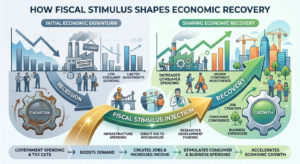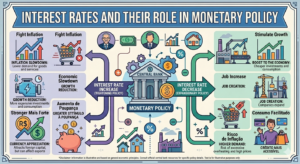In an increasingly complex world, financial literacy is no longer a luxury but a fundamental life skill. From managing daily budgets and understanding credit to planning for retirement and making informed investment decisions, the demands on an individual’s financial acumen are ever-growing. In the United Kingdom, where economic shifts, evolving job markets, and a greater emphasis on personal responsibility for financial security are the norm, the need for robust financial education has never been more pressing. This detailed article explores the vital importance of financial education in the UK, highlights the diverse range of resources and programmes available to individuals of all ages, and underscores the collective effort required to foster a financially empowered nation.
Why Financial Education Matters: The Imperative for the UK
The case for comprehensive financial education in the UK is compelling, driven by several key factors:
- Tackling the Debt Crisis: A lack of understanding about borrowing, interest rates, and repayment terms can lead to unsustainable debt, affecting individuals’ mental health, relationships, and long-term financial stability.
- Boosting Savings and Investment: Without knowledge of savings vehicles, investment principles, and the power of compounding, many miss opportunities to grow their wealth, relying solely on volatile income streams.
- Navigating Complex Products: The financial services industry offers an ever-expanding array of products – from mortgages and pensions to insurance and investment funds. Informed decision-making requires a foundational understanding of these tools.
- Preparing for Retirement: The shift from defined benefit to defined contribution pensions places greater responsibility on individuals to save adequately and manage their pension pots effectively for a comfortable retirement.
- Protecting Against Fraud: Financially literate individuals are better equipped to identify and avoid scams, which are increasingly sophisticated and prevalent.
- Promoting Social Mobility: Early financial education can level the playing field, equipping individuals from all socio-economic backgrounds with the skills needed to build wealth and improve their life chances.
- Economic Stability: A financially literate populace contributes to a more stable economy, with fewer defaults, more prudent borrowing, and greater participation in productive investment.
Key Pillars of Financial Education in the UK
Financial education in the UK is delivered through various channels, targeting different age groups and needs:
1. Education System (Schools): While not always a standalone subject, elements of financial education are integrated into the national curriculum, particularly within:
- Mathematics: Basic budgeting, interest calculations, percentages.
- Citizenship: Understanding public money, taxation, and the role of financial institutions.
- PSHE (Personal, Social, Health and Economic Education): Exploring personal finance topics like managing money, debt, savings, and making informed choices.
- Challenges: The depth and consistency of delivery can vary significantly between schools, often depending on teacher confidence and resources.
2. Government-Backed Initiatives and Public Bodies:
- MoneyHelper (formerly the Money Advice Service): This free, impartial service, backed by the UK government and part of the Money and Pensions Service (MaPS), is arguably the most comprehensive resource. It offers:
- Online Guides and Tools: Covering budgeting, debt management, savings, pensions, mortgages, and more.
- Debt Advice Locator: Connects individuals with free, regulated debt advice providers.
- Pension Wise: Provides free, impartial guidance to over 50s on their defined contribution pension options.
- Phone and Webchat Support: For personalised guidance.
- The Pensions Regulator (TPR): Provides information and guidance for employers and trustees on workplace pensions, indirectly supporting employee understanding.
- Financial Conduct Authority (FCA): As the financial regulator, the FCA publishes consumer alerts, educational materials, and sets rules for how financial products are sold, aiming to ensure fair treatment of customers.
3. Charitable Organisations and Non-Profits: These bodies play a crucial role in providing accessible, often free, and impartial advice and education, particularly to vulnerable groups:
- Citizens Advice: Offers free, confidential advice on a vast range of issues, including debt, benefits, employment, and housing, often with a strong financial education component.
- StepChange Debt Charity: The UK’s leading debt charity, providing free debt advice and debt management plans. They also offer resources on preventing debt.
- National Debtline: Provides free debt advice by phone and online.
- Young Enterprise: Focuses on empowering young people with business and financial skills through programmes in schools and colleges.
- MyBnk: Delivers financial education directly to young people in schools and youth organisations, focusing on practical money management.
4. Financial Services Industry: Many banks, building societies, and investment firms offer their own educational resources, often through blogs, articles, webinars, and online tools. While these can be informative, it’s crucial to remember they may also be marketing tools for their products.
5. Online Resources and Digital Tools: The digital age has brought a wealth of online platforms and apps dedicated to financial education:
- Budgeting Apps: (e.g., Monzo, Starling Bank, YNAB, Plum) Help users track spending, set budgets, and visualise their financial habits.
- Comparison Websites: (e.g., MoneySavingExpert.com, Comparethemarket.com) Empower consumers to compare financial products like insurance, loans, and savings accounts.
- Investment Platforms’ Educational Sections: (e.g., Vanguard, Hargreaves Lansdown, AJ Bell) Offer guides and articles on investing concepts.
- Personal Finance Blogs and Podcasts: Independent creators often share accessible insights and practical tips.
Strategies for Effective Financial Learning
For individuals looking to enhance their financial literacy, here are some actionable strategies:
- Start with MoneyHelper: Make MoneyHelper.org.uk your first port of call. It’s a goldmine of unbiased information and tools.
- Create a Budget: The most practical way to learn about managing money is by doing it. Use an app or spreadsheet to track income and expenditure.
- Automate Savings: Set up a standing order to transfer a small amount from your current account to a savings account every payday. This instils discipline.
- Review Your Bank Statements: Regularly check your transactions to understand where your money is going and spot any unnecessary subscriptions or fraudulent activity.
- Understand Your Payslip: Know what each deduction (tax, National Insurance, pension) means.
- Learn About Credit: Before taking on any debt, understand how credit scores work, the APR, and the full repayment terms.
- Engage with Your Pension: Don’t ignore your workplace pension. Understand how much you and your employer are contributing and how the fund is invested. Use Pension Wise guidance when nearing retirement.
- Seek Impartial Advice: If you have complex financial questions or are struggling with debt, always turn to free, regulated advice services rather than commercial firms that may charge fees.
- Be Skeptical: Approach ‘get rich quick’ schemes or unsolicited investment opportunities with extreme caution. If it sounds too good to be true, it probably is.
- Talk About Money: Breaking the taboo around discussing finances can lead to shared learning and better decision-making within families and communities.
The Path Ahead: Challenges and Opportunities
Despite the array of resources, significant challenges remain in achieving universal financial literacy in the UK. These include:
- Inconsistent School Delivery: Ensuring all young people receive high-quality, consistent financial education from an early age remains a hurdle.
- Engagement Gaps: Reaching vulnerable groups or those who are disengaged with financial topics requires tailored approaches.
- Digital Divide: While online resources are abundant, access and digital literacy can be barriers for some.
- Keeping Pace with Innovation: The financial landscape is constantly evolving (e.g., cryptocurrencies, BNPL schemes), requiring continuous updates to educational content.
However, the opportunities are equally vast. With continued collaboration between government, charities, the education sector, and the financial industry, the UK can further embed financial education as a lifelong learning process. Empowering individuals with the knowledge and confidence to make informed financial decisions is not just about personal prosperity; it’s about building a more resilient, stable, and equitable society for all. The journey from understanding pocket money to planning for a pension is long, but with the right resources, it’s a journey everyone in the UK can successfully navigate.







